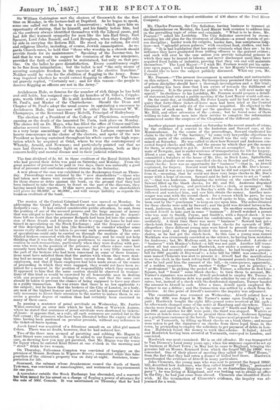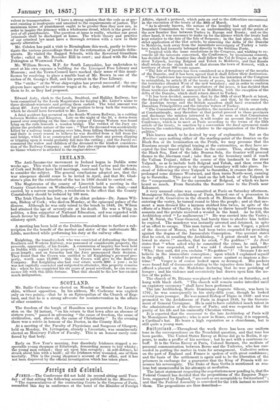Another _piquant page was added on Saturday to the recent
annals of crime, by the evidence of a convict in the Anderson and Seward case, at the Mansionhouse. In the course of the proceedings, Simard vindicated his claim to the title of " the barrister," by some very lawyerlilce objections to certain parts of the evidence. Henry Atwell was the only witness examined on Saturday. He was called to show how Seward and Anderson concocted forged checks and bills, and the means by which they got the money
i
for them, or attempted to get t. Atwell was an accomplice. He is an inmate of Newgate, and is under sentence of transportation for life for forgery. About a year ago, he said, he became acquainted with Seward. Having committed a burglary at, the house of Mr. Doe, in Brick Lane, Spitalfields, among his plunder were some cancelled checks on Barclay and Co., and two blank checks : here was an opportunity for "business "—that is as Atwell explained, for forgery. Seward went with him to look at Mr. Doe's house; Seward said it was not a large firm, and that he did not expect to get much from it,—meaning, that he could not draw very large checks in Mr. Doe's name with a hope of success. Saward said he had a person to act as "sender,"—that was Anacreon. Imitating the writing ou the cancelled checks, Seward filled up the blank checks, for 46/. and 95/. Anderson disguised himself, took a lodging, and pretended to hire a clerk, or messenger : tins innocent instrument was sent to Barclay's with the cheek for 46/. ; Atwell followed mid watched him, and saw him obtain the money. Another messenger was Bent with the second check : for a reason which he gave, he was not returning direct with the cash, so Atwell spoke to him, saying he hail been sent by the" gentleman" to keep an eye upon him. The notes obtained for these chocks were sold by Seward ; and the gold was divided between Seward, Anderson, Atwell, and two otherinen. On another occasion, Seward invited Atwell to take part in some " busineea" : Atwell watched a person who was sent to Smith, Payne, and Smith's with a forged check : it was not paid ; Atwell quickly informed his confederates, and they escaped immediately. A third time there was more " business " : Seward had got a check-book from Ransom's ; he forged three checks for upwards of 200/. altogether; three different young men were hired to present these checks ; they were paid ; and the gang divided the money, Seward receiving two shares, as he had got the check-book. In this ease a young man named Markham was erroneously convicted as the utterer, he having been mistaken for Anderson ; but, Mr. Mullens said, he was long ago liberated. A stroke of "business" with Hankey's failed—a bill was not paid. Another bill transaction all but succeeded : one Hardwick, now under a sentence of transportation, had recently returned from Australia ; he had brought a genuine bill for 200/. payable at Heywood's ; a false bill for 1000/. was concocted ; a man named Clements was sent to present it : Atwell had the mortification to see the clerk in the bank taking back the thousand pounds from Clements after he had paid him the amount of the bill,—in consequence, apparently, of a sudden suspicion. Then another " dodge " was put in practice : a " professional" in picking the pocket of Mr. Turner, a solicitor in Red Lion Square, had " found " some blank checks to turn them to account, Mr. Turner's signature was needed ; Atwell pretended to employ Mr. Turner to sue a man ; the fictitious debt was paid to the solicitor by one of the confederates; but, instead of a check with the dcsiderated signature, Turner handed the amount to Atwell in cash. After a time, Atwell again employed Mr. Turner to sue a debtor ; and the transaction was settled by a check from the solicitor. At this point of Atwell's narrative the inquiry was adjourned.
The examination was resumed on Wednesday. Atwell related how a check for 410/. was forged in Mr. Turner's name upon Gosling's : it was paid ; Hardwick bought the eight fifty-pound notes received at 351. each ; he afterwards changed some of the notes at Hamburg and elsewhere. Three checks were forged on Hankey's, in the name of" Smith and Keight"; one for 1001. and another for M. were paid ; the third was stopped. Waiters or porters at hotels were employed to present these checks ; .Anderson figuring as a gentleman customer at the hotels. The rogues next proposed to do " business " at Yarmouth, by filling up blank cheeks on a bank there and means were taken to get the signatures on checks from three legal there; in the. town, by pretending to employ the solicitor§ to get payment of debts in Leddon: Hardwick found the money to week this scheme. It failed; Atwell and Hardwick having been arrested at Yarmouth, conveyed to London, and convicted.
Hardwick was next examined. He is an old offender, He was transported to Van Diemen's Land many years ago when his ffetrtence expired he set up in business at Hobart Town ; in May lest lie came to *gland bringing the genuine bill on Messrs. Kennard from which the forged 1011.111. 000/. was concocted. One of their places of meeting they called the eif House," from the fact that they had eaten a dinner of boiled beef there. Hardwick corroborated the evidence of Atwell in many particulars. John Clements, the young man who was sent to present the forged 1000/. bill, described how Anderson, who then called himself "Riley" pretended to hire him as a clerk. Riley was "agent to an Australian shipping company"; he was living at Kingsland, and was looking out to obtain an office • mile City; he had Just come from abroad. Clements also identified Hardwick. At the termination of Clements's evidence, the inquiry was adjourned for a week. valent to transportation. "I have a strong opinion that the code as at present existing is inadequate and unsuited to the requirements of justice. The maximum terms of punishment ought to be greater than they now are, in order to inspire the prisoner with a wholesome dread, which is the great object of all punishments. The question at issue is really, whether our great criminals shall be discharged at home. The whole theory and practice of our criminal law must have a thorough revision with a view to their speedy alteration."
Mr. Cobden has paid a visit to Birmingham this week, partly to investigate the various proceedings there for the reformation of juvenile delinquents. He visited the Ragged Schools, with the Reverend Grantham Yorke ; called on Mr. Recorder Hill in court ; and dined with Sir John Pakington at Westwood Park.
Mr. William Brown, M.P. for South Lancashire, has undertaken to erect at his own expense a building for the Liverpool Free Library and Museum ; and the Town-Council have marked their sense of this munificence by resolving to place a marble bust of Mr. Brown in one of the niches of St. George's Hall, and his portrait in the Free Library.
The " strike " of the Wear shipwrights has proved successful; the employers have agreed to continue wages at 6s. a day, instead of reducing them to 5s. as they had proposed.





























 Previous page
Previous page